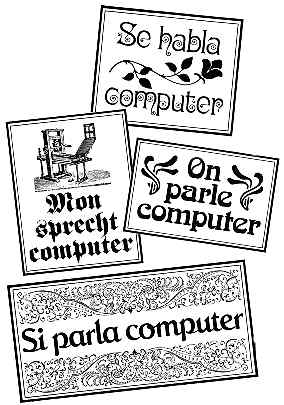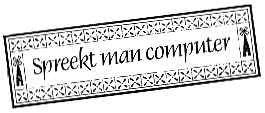A NEW LANGUAGE
by Fabrizio Franzi
Fabrizio Franzi is the founder and president of ALPHEE, a Brussels-based international computer consulting and software distribution firm specializing in artificial intelligence.
Not unlike the pidgin English that spread among traders throughout the South Seas, Computer English is a lingua franca essential to international communications. Everywhere this odd jargon, full of words and expressions whose meanings are quite different from those taught in school, is being learned by computer users as a means of conversing with each other and with their machines.
Fortunately, those of us for whom English is not a native tongue need to know less than two thousand words to communicate in this computer age dialect. And, too, the vocabulary of Computer English can often be assimilated into our own language structure: words can be incorporated unchanged, as in the Italian fare un file ("create a file"), or endings can be tacked on, as in the French booter ("to boot"). It might not be elegant, but it does the job.

Speaking Computer
Whether Computer English is used for convenience, for snob appeal or, as is most often the case, for the sake of precision, two sources of difficulty are presented to the new speakers: technical terms like "random access memory" that exist only in information processing (or in other technical disciplines and have been borrowed) and those that first appeared in the folklore of computers.
Of most interest is the second category, where everyday use and "computerese" meanings are quite different. These terms reflect the originality of the microcomputer community, defy translation and sow confusion. Often we hear sentences like "There is a glitch in this program" or "The card goes in the bus." I overheard a friend of mine, a French free-lance technical translator, ask her computer consultant husband:
"What do flies have to do with computer software?" She was referring to the word "bug," of course, whose computer meaning is still mostly unknown on the Continent.
Abbreviations provide another example of the peculiarities of Computer English. The abbreviation for personal computer is PC; the abbreviation in French should be OP, (for ordinateur personnel), but most of the time we use "pay-say"-which is our pronunciation of PC. Suffice it to say that proficiency in acronyms and abbreviated jargon is strongly recommended in the world of international communications.
The acceptance of Computer English varies in degree from country to country. In Holland, Belgium and the Scandinavian countries, where English is spoken quite fluently, the new language is used freely and meets little resistance. In Germany and France, where fluency in English is less common, Computer English is used for the most part by business and computing professionals; these two major European countries are protective of their language and place a great deal of emphasis on documentation in their native tongue, in certain cases imposing specific linguistic regulations. In the remaining non-English-speaking European countries, most interested people get by with moderate fluency in Computer English and don't make much fuss.
Independently of their countries' official cultural policies, Europeans agree that the relative precision of Computer English results in shorter sentences and a simpler style. When an attempt to coin an equivalent for "cursor" in German produced bildeschirmanzeiger, it was quickly decided to use the English word. Since curseur already exists in French, we use our own term; the correct French term for "disk drive" is tournedisque, similar to our word for "phonograph," so to avoid linguistic confusion we usually give way to the English.

Computer Esperanto?
No one can accurately predict how Computer English will fare in the non-English-speaking community, but here and there can be found some underlying trends. It is fair to say that terms related to a computer's system software will remain solidly based in Computer English. Now that operating systems like CP/M and MS-DOS have become international standards, their vocabularies will also become standard. COBOL, BASIC and Pascal statements have attained the same status, since there are few workable alternatives to these Computer English-based programming languages. An attempt to translate BASIC into French may work from an operational point of view, but seems to have been a peculiar waste of gray matter. Most computer programs are still written in the English-derived BASIC.
The common names of the utilities needed in the normal use of a computer (e.g., "copy," "catalog," "pip," "stat," "delete," etc.) represent a precise sequence of events. Their names are either acronyms, contractions or plain English words. Because they do things specific to computers, their direct translation must also reflect the operations involved. Generally, it is easier to associate these operational aspects to one English expression rather than to a series of identical French or German equivalents.
Keyboard functions provide other short English words that are here to stay: "reset," "shift," "clear," "return," "enter." We find these on pocket calculators, micros or mainframes. Some manufacturers translate their keycaps, but when last in a computer shop I heard the following words from a Flemish-speaking customer who was being assailed with the virtues of the Wang-PC translated keyboard: "Oh," said the customer, "this is the `Clear' key . . ."
Maybe simplicity is not always of this world, yet we all crave it because it's so hard to digest the mass of information we're subjected to every day. After this cosmopolitan tour, let us part, dear reader and microcomputer pal, with this thought from our newly discovered international dialect: "Groovy, mon ami, c'est la vie des PC!"
| FRENCH COMPUTER NO-NO'S On December 22, 1981, in a gesture of concern over the creeping Americanization of Gallic culture, the French government issued an edict banning U.S.-derived computer terms from official documents. Below are just a few of these betes noires, with their sanctioned French translations.
|
Return to Table of Contents | Previous Article | Next Article

